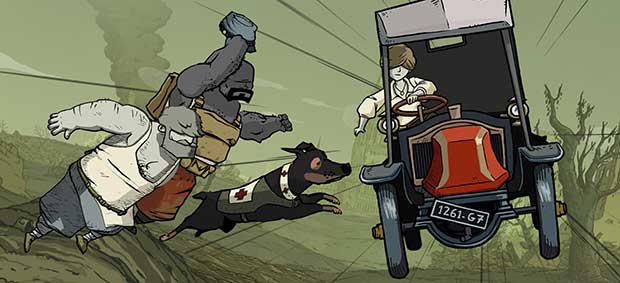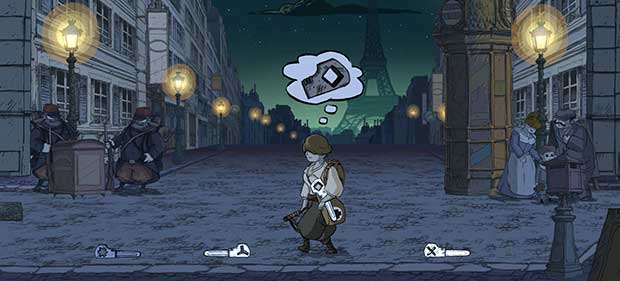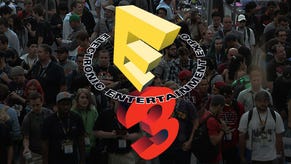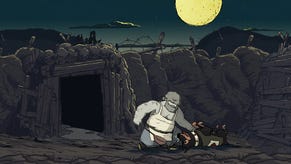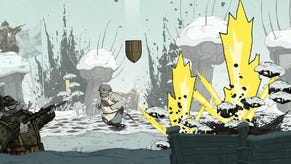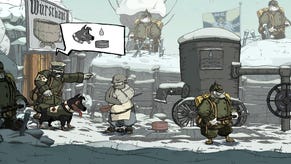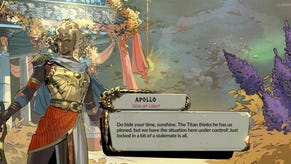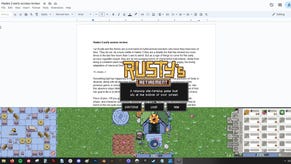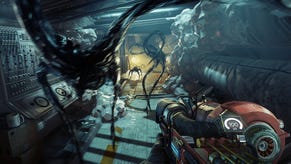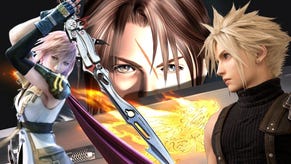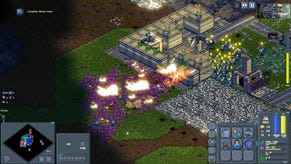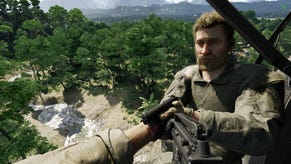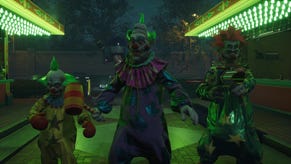Wot I Think- Valiant Hearts: The Great War
War_Dogs
Wacky, wacky World War 1. Should I be weeping or clapping with joy? Valiant Hearts is one of the most beautiful games I've ever played, but I'm not sure what it wants me to feel. One minute I'm being shown the terrible price of war - witnessing the hideous aftermath of a gas attack or using a bonesaw to brutally save the life of a shelling victim - and in another I'm defeating a magnificently-moustachioed German zeppelin commander by making a dog play a church organ at him.
Most of the time I'm scouring the ground for a lever that will open a door or raise a lift, however. Despite deviations into stealth and the lightest touch of combat, and despite breathtaking scenery, this is at heart an extremely traditional, open-the-locked-door puzzle game. It can be a bit of a drag because its puzzles are usually immediately obvious but take a fair bit of schlepping about to achieve, yet continuing to play is absolutely irresistible because Valiant Hearts looks and sounds so good.
Using the 2D animation-like engine that powers the most recent couple of (brilliant) Rayman games, this looks like a French cartoon come to interactive life. Les Triplettes de Belleville as a side-on point'n'click adventure starring a revolving cast and slowly spanning the length of the Great War, if you like. There are even occasional musical interludes, including a high-speed car pursuit down the Champs-Élysées staged as a vehicular tango.
That particular setpiece is representative of Valiant Hearts as a whole, in fact - the sound and vision as the cars slide, the Moulin Rouge music booms and bombs drop in the distance is majestically bold and inventive, but the driving itself is highly irritating rhythm action-lite, dodging left or right as pop-up icons denote which direction the next enemy vehicle will arrive from. Immediately following this stylish silliness, we're healing the horrifyingly wounded out on the front line, with bone-setting and bandaging achieved via another ill-fitting rhythm action minigame.
I'm not hugely familiar with modern bandes dessinées, so perhaps this sort of rapid-fire tonal switching is in the bones of Valiant Hearts' inky inspirations, but I did find it destabilising here. This is Asterix bookended by sporadic tragedy, not Journey's End. It's not even the final episode of Blackadder Goes Forth - it's more like Horrible Histories starring the A-Team, all 'toonish maimings and madcap DIY escapes. I reiterate that so that you know what you're going into, because I must admit I'm affected by having seen the trailers and thus left expecting out-and-out Wilfred Owen fare.
No way was I stopping playing, even when the puzzles were at their most banal and the rhythm action field medicine sections at their most seemingly endless. A major publisher trying something like this? Something that looks like this? Something that has a big, open heart throughout its surprising/excessive length? Something that has extremely capable protagonists of various genders, ethnicities and allegiances without screeching about it, without treating any one of them as less than equal to the others and without fudging anything in the name of tokenism?
Ubisoft have come under scrutiny, including of course on this site, for the contentious reasoning they've given for their upcoming games' character choices lately, so it's extremely heartening to see that there are people within the company making a game that quietly gets it right, and makes it seem like the most natural thing in the world at the same time. That's all we ever wanted.
There is a semi-playable dog too, but this isn't War Horse - instead he's an anthropomorphised super-chum whose grinning appearance and Lassie-like heroism has me now wondering whether this is designed to be first and foremost a kids' game. If it were, the excess of oft-jarring wackiness makes a lot more sense - lure the wee ones in with Tin-Tin-like derring-do and slapstick, and then whisper dark truths about Europe at War and the cost of conflict into their ears. This would also explain why most of the puzzles are so easily solved.
Playing Valiant Hearts myself, wanting to be moved more than I wanted to repeatedly pull levers, I felt confused and sometimes frustrated. In five years' time, perhaps I'll play it with my then-six-year-old daughter, telling her about the evil that men do as she commands the dog to pull an instantly-healed soldier from the wreckage, or lobs a toylike grenade into the engine of an oversized blimp, or makes a huge church bell plunge through three wooden floors to create an exit.
Perhaps we'll pause between puzzles to read the carefully brief notes about the real-world scenarios they're set in, what led to them and what they did to people.
Perhaps she'll ask me questions about why nations fight each other, about why anyone thinks taking someone else's life solves anything. Perhaps this would then seem not like an artistic adventure game with a bizarrely shifting tone, and instead like a Lego game with a message. An important game.
If that kind of scene happens anywhere, to anyone, in the wake of this gorgeous, odd, awkward game, it is absolutely justified in everything it does and every seemingly odd decision it makes.
As it is, played as a lone adult, Valiant Hearts is a truly wonderful spectacle, backed up by truly wonderful music and deftly simple-but-effective characterisation. The often repetitive and perfunctory puzzles grate, and the giddy switching between the tragic and the absurd creates frustration, but there is no world in which I'd let those factors make me miss what Valiant Hearts gets right.
Valiant Hearts: The Great War is released tomorrow.
